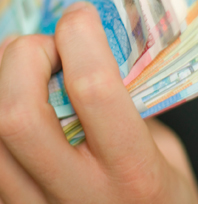Media coverage in the last month continues to demonstrate how vulnerable the general public is to internet fraud, writes Jim Gannon.
In the last month I have experienced two attempts by people posing to be from BT and Barclays Bank. On both occasions I followed these up and confirmed with these organisations that they were attempted scams but I have to admit they were pretty good attempts and could have easily fooled someone who is less aware of what is currently going on.
The Sunday Times money section carried a superb feature in January, written by Ali Hussain in which he outlines the concerns being expressed by what has been described as the ‘open banking revolution’. These reforms basically provide consumers with the facility to download an app which will allow a company (with your authorisation) to access your current account details to establish whether moving your account to another bank or building society could actually save you money and estimate what those savings may be. Apparently both the Government and the banking world are encouraging this.
Absolute madness
Britain is going to be the first country to introduce this scheme even though there are fears that this could leave customers open to online crime by opening up their personal banking data to third parties. The open banking revolution was the idea of the Competition and Markets Authority (CMA) after it carried out a thorough investigation over a two year period with the general conclusion that people were paying over the odds for their banking. So two years spent coming up with a conclusion that most of us knew anyway and which could easily be remedied by simply capping bank charges.
It’s against a background of spiralling internet-enabled fraud, supported by data released from organisations such as UK Payments, who state remote banking fraud involving internet, mobile and phone banking has doubled since 2013. They state reported losses have surged from £31.7m to £73.8m during the last four years. Put this with all the pitfalls already experienced by internet banking consumers, including those who have had accounts drained by simply making an error with electronic transfer details, it is no surprise to me that the consumer group ‘Which’ feels this change could lead to a rise in payment scams. The final stab in the back is that giving a third party access to personal banking data could effectively expose consumers to fraud liability with banks.
The final injustice
While there will no doubt be people who will welcome this new opportunity as a way to reduce their outgoing expenditure I am reminded that it was only a few years ago when our utilities went into open competition and look where that has got us. I recall unsolicited telephone calls day and night trying to get me to switch. Well apparently over the coming months you can look forward to a similar experience but this time it will include internet communication from price comparison sites, rival banks and all those companies set up purely to make some money from you and waste your time.
Add to basket
In March this year we were treated to even more enlightening news that the crime world does not just want your personal banking details; they want even more, to carry out successful identity scams and they are already accessing personal data from popular websites. Research carried out by top10vpn.com a virtual private network comparison site, discovered personal account details on offer for numerous popular websites. Free access to such sites realistically enables fraudsters to glean personal data which can then be assembled to facilitate identity fraud. Many online accounts contain snippets of personal data which when put together give sufficient information to build an identity picture.
According to Financial Fraud Action UK, now part of the trade body UK Finance, someone in the UK is defrauded every 15 seconds and it maintains that criminals use of compromised personal and financial data is a key driver of fraud. This statement alone suggests the open banking revolution is at best ‘ill advised’ and at worst an open door to further online fraud crime.
With reports that illicitly obtained data can be purchased for as little as a fiver and that a Paypal login can sell for around £250 with bank details for sums like £160 is it any wonder why fraud figures are escalating across the world scene. The most convincing conmen are those who can slip in personal information into conversations and communications trying to catch you off guard. Couple this with impersonating legitimate organisations such as banks or those businesses you already trade with, then you have all the components in place to execute fraud.
If it sounds or looks suspect it probably is, so if you think your personal data has been compromised contact your bank or building society immediately. If you believe your financial information has been stolen report your concerns to Action Fraud: visit actionfraud.police.uk or ring 0300 123 2040.









